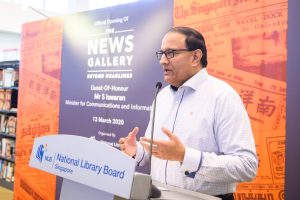Singapore’s first ministerial corruption trial in nearly half a century opened this morning, with former Transport Minister S. Iswaran pleading guilty to five of the 35 charges against him.
According to a report by Channel News Asia, the 62-year-old admitted to four charges under Section 165 of the Penal Code, which forbids public servants from obtaining anything of value from any person with whom they are involved in an official capacity. He also pleaded guilty to one charge of obstructing justice.
During this morning’s heading, Deputy Attorney-General Tai Wei Shyong announced that the prosecution was replacing two charges under the Prevention of Corruption Act with less charges under Section 165. Iswaran’s defence lawyer, Senior Counsel Davinder Singh, then confirmed that his client would be pleading guilty.
“My client will be taking a certain course of action in view of the fact that the prosecution is no longer proceeding on charges under the Prevention of Corruption Act,” Singh told the court, CNA reported.
A long-time member of the People’s Action Party (PAP) who played an important role in bringing Formula 1 racing to Singapore in 2008, S. Iswaran was arrested along with hotel tycoon Ong Beng Seng in July of last year. He tendered his resignation to Prime Minister Lee Hsien Loong in January.
In January, prosecutors announced 27 charges against Iswaran, including two counts of corruption under the Prevention of Corruption Act, one of obstructing justice, and 24 of obtaining valuables worth S$384,340 ($286,181) as a public servant under the Penal Code.
Most of these involved tickets to exclusive events, including the Singapore Grand Prix, Premier League football matches, and West End theater productions, which he allegedly received from Ong Beng Seng. Iswaran is accused of advancing Ong’s business interests in exchange for the gifts. Prosecutors announced eight more charges in March, alleging that he received valuable items worth an addition S$19,000 ($14,000), including golf clubs and bottles of whiskey, from Lum Kok Seng, a contractor who had dealings with the government. At the time that these charges were announced, Iswaran pleaded not guilty and pledged to prove his innocence in court.
As the trial opened this morning, however, prosecutors made the surprise decision to move forward with just the five charges. They said that they will apply for the remaining 30 charges to be taken into consideration during sentencing.
This seems to suggest a desire to move quickly through the trial, the first time in nearly four decades that a cabinet minister has been investigated for graft. The last took place in 1986, when Minister for National Development Teh Cheang Wan was accused of accepting around S$1 million in bribes but died of suicide before his case could come to trial.
The fact that such trials are so rare speaks to the PAP’s successes in disincentivizing corruption among civil servants, through a combination of highly competitive salaries and severe punishment for those who break the law. But for the very same reason, the current trial also creates potential political hazards for the party, especially if it sheds light on the cushy relationships among the city-state’s political and business elite. The authorities therefore have both practical and political reasons to want a quick trial.
As Nicholas Yong wrote for Al Jazeera yesterday, the timing of the trial may well have been dictated by the recent leadership succession, which saw Prime Minister Lawrence Wong take the baton from Lee in May, and the general election that is due to be held by November 2025 – but could well take place sooner.
“The Iswaran trial must be a significant factor in Wong’s mind while he is deciding about when to go to the polls,” Michael Barr of Flinders University in Adelaide told Al Jazeera. “They would prefer to have the trial either well in the future or long in the past, so it can be kept out of sight and out of mind.”
































